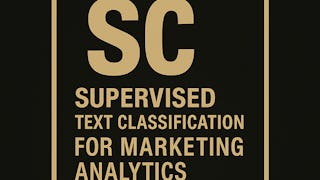Marketing data is often so big that humans cannot read or analyze a representative sample of it to understand what insights might lie within. In this course, learners use unsupervised deep learning to train algorithms to extract topics and insights from text data. Learners walk through a conceptual overview of unsupervised machine learning and dive into real-world datasets through instructor-led tutorials in Python. The course concludes with a major project.



Unsupervised Text Classification for Marketing Analytics
This course is part of Text Marketing Analytics Specialization


Instructors: Chris J. Vargo
Access provided by University of Colombo School of Computing
Recommended experience
What you'll learn
Describe the concept of topic modeling and related terminology (e.g., unsupervised machine learning)
Apply topic modeling to marketing data via a peer-graded project
Apply topic modeling to a variety of popular marketing use cases via homework assignments
Evaluate, tune and improve the performance the topic model you create for your project
Skills you'll gain
Details to know

Add to your LinkedIn profile
2 assignments
See how employees at top companies are mastering in-demand skills

Build your subject-matter expertise
- Learn new concepts from industry experts
- Gain a foundational understanding of a subject or tool
- Develop job-relevant skills with hands-on projects
- Earn a shareable career certificate

There are 5 modules in this course
In this module, we will cover the fundamental concepts of topic modeling, also known as unsupervised machine learning on unstructured text documents. We will contrast unsupervised methods to supervised ones and survey common applications of topic modeling.
What's included
2 videos4 readings1 programming assignment1 discussion prompt
In this module, we will go under the hood inside a topic modeling approach and understand what assumptions drive topic model fit. We will also uncover how bag-of-words approaches to topic modeling work, and the natural language processing required to produce meaningful topic modeling features.
What's included
2 videos1 reading1 assignment1 programming assignment
In this module, we will cover how to parse through JSON-like data and segment it to create a corpus that is ready for the topic modeling process. We will cover how the data for your project is structured and its taxonomy.
What's included
2 videos2 readings1 assignment
In this module, we will take Amazon review data and load it into a corpus to preprocess it. We will cover how to build topic models from the data and also save those topic models.
What's included
2 videos2 readings1 peer review
In this module, we will learn how to evaluate the fit of topic models and use the best topic model to classify documents. We will also cover how to build topic models with pre-trained neural networks.
What's included
3 videos3 readings1 peer review
Earn a career certificate
Add this credential to your LinkedIn profile, resume, or CV. Share it on social media and in your performance review.
Build toward a degree
This course is part of the following degree program(s) offered by University of Colorado Boulder. If you are admitted and enroll, your completed coursework may count toward your degree learning and your progress can transfer with you.¹
Instructors


Offered by
Why people choose Coursera for their career




Explore more from Data Science

University of Colorado Boulder

University of Colorado Boulder

O.P. Jindal Global University

University of Colorado Boulder

